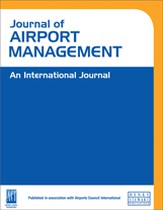Aviation security: An evaluation of the ‘opt-out’ option for airport operators
Abstract
Aviation regulation began in 1925 with the passage of the Postal Act and the Air Commerce Act. It advanced in 1958 with the passage of the Federal Aviation Act, and was subsequently amended in the early 1970s after a rash of hijackings. It was not until the catastrophic events of September 11th, 2001 that aviation security had dramatic change. As part of that sweeping change, Congress mandated a programme to allow airports to opt out of the newly formed Transportation Security Administration (TSA)'s federal screening workforce and instead utilise private contractors. This study evaluated the comparability of the federal versus private workforces and the perception of the ‘opt-out’ option by the airport operators. It was found that many airport operators had established good relationships with TSA management and felt that bringing in outside contractors was unwarranted, while others were concerned about legal or financial ramifications. Overall, the study determined that if the private contractors were able to provide their services at the costs promised, then the ‘opt-out’ option would be a viable way potentially to reduce government cost and would help to stabilise TSA's budget while maintaining the security standards required after the 9/11 terrorist attacks.
The full article is available to subscribers to the journal.
